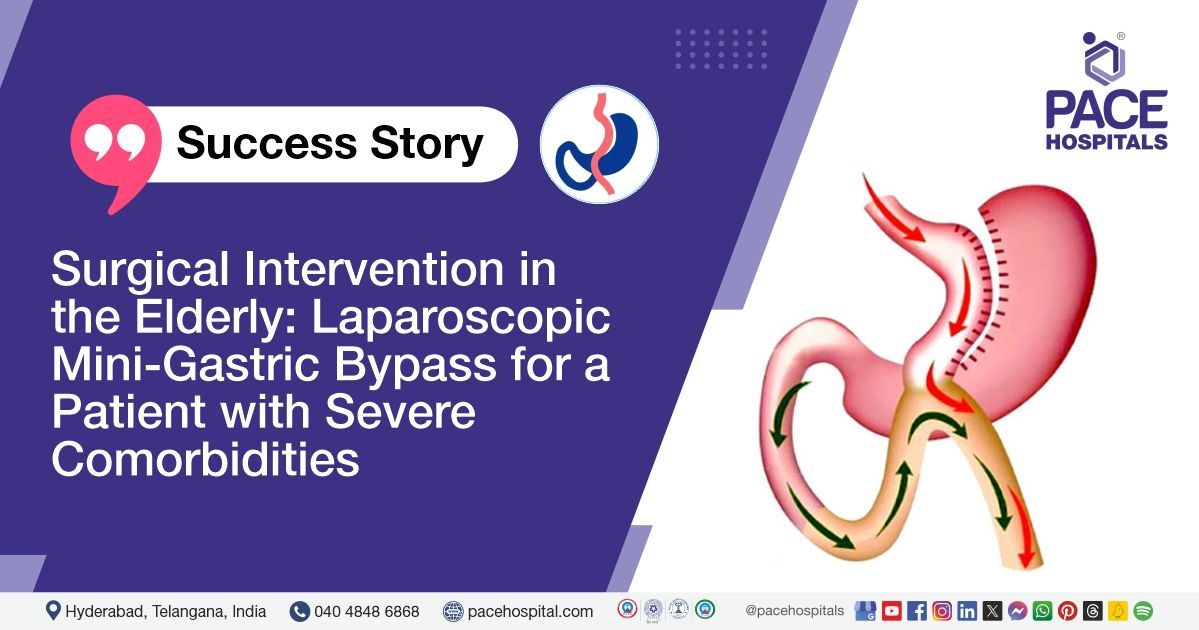Surgical Intervention in the Elderly: Laparoscopic Mini-Gastric Bypass for a Patient with Severe Comorbidities
PACE Hospitals
PACE Hospitals' Bariatric and Metabolic Surgery team successfully performed a Laparoscopic Mini Gastric Bypass for a 60-year-old male with morbid obesity (BMI: 45.3).
A 60-year-old male patient with morbid obesity (BMI of 45.3), a known case of hypertension, diabetes mellitus, chronic obstructive pulmonary disease, bilateral total knee replacement done 12 years ago, obstructive sleep apnea, previously operated for varicose vein twice and was presented to the Consultant Surgical Gastroenterologist, Dr. Phani Krishna Ravula, at PACE Hospitals, Hitech City, Hyderabad.
Medical History
Delving deeper, it was understood that the patient was suffering from morbid obesity with a BMI of 45.3, a known case of hypertension, diabetes mellitus, chronic obstructive pulmonary disease, bilateral total knee replacement done 12 years ago, obstructive sleep apnea, underwent surgery for varicose vein twice, which led to his admission to the PACE Hospitals for
bariatric surgery.
Diagnosis
Upon being admitted to PACE Hospitals and after a thorough history and physical examination, as well as evaluation of diagnostic investigations, the patient was diagnosed with morbid obesity (BMI 45.3).
The patient was diagnosed with morbid obesity (class III); a chronic, lifelong, multifactorial condition marked by excessive fat storage. This severe form of obesity is defined by a body mass index (BMI) of 40 or higher or 35 or higher with obesity-related health consequences (hypertension, diabetes, severely limited musculoskeletal problems).
The patient also had hypertension (high blood pressure), diabetes mellitus (high blood glucose levels), chronic obstructive pulmonary disease (COPD) (group of lung conditions that result in breathing difficulties), bilateral total knee replacement done 12 years ago, obstructive sleep apnea (sleep-related breathing disorder), and undergone surgery for varicose vein twice.
The Mini Gastric Bypass (MGB) is a type of weight loss surgery performed laparoscopically that includes a long gastric conduit, a jejunal bypass, and a broad gastro-jejunostomy (GJ), which connects the stomach directly to the lower part of the intestine to speed up digestion. To achieve this, the surgeon creates a small pouch in the stomach and redirects the small intestine so that food goes directly from the pouch to the small bowel, bypassing some of the bowel and reducing excessive calorie absorption.
This procedure results in an effective weight loss and promotes good metabolism (the conversion of food into energy). In addition to treating
obesity, this surgery is extremely effective at managing high blood pressure, diabetes, high cholesterol, and sleep apnea, among other conditions.
Treatment
After consultations with the team of surgical gastroenterologists, bariatric and metabolic surgeons - Dr. Phani Krishna Ravula, and Dr. Suresh Kumar S, it was determined that a Laparoscopic Mini Gastric Bypass procedure was the most effective method of treating the patient.
After the necessary investigations were performed and clearances were obtained, the patient was administered intravenous antibiotics, and later, the Laparoscopic Mini Gastric Bypass procedure was performed.
A 50-cc gastric pouch was created to provide effective restriction. A 40-mm gastrojejunostomy (GJ) anastomosis was performed as part of the One-Anastomosis Gastric Bypass (OAGB) surgery with anti-reflux. The biliopancreatic limb was fixed to 150 cm, within the standard range for this procedure. This duration is essential for enabling appropriate malabsorption of nutrients, which contributes to weight reduction while maintaining some nutritional absorption. The surgical procedure was successful.
Aftermath
The post-operative period was uneventful. The patient was given intravenous antibiotics, antacids, analgesics, and intravenous (IV) fluids to manage any immediate post-operative needs.
Post-surgery, the patient was started on sips of liquids on post-operative day (POD 2), which were gradually increased to full oral liquids by POD 3. Chest physiotherapy and ambulation (the ability to walk) were encouraged. The patient was tolerating orally well and was in a stable condition at discharge.
The patient was sent home with necessary medications, follow-up instructions, and advised to follow a liquid diet as advised by the dietician including a liquid diet for one week, a puréed diet for one week, followed by a soft diet. He was advised to attend bariatric support group meetings and avoid strenuous activities for 2 weeks.
The patient was also instructed to contact PACE Hospitals' emergency room / casualty at once in case of bleeding, fever higher than 100°F, wound discharge, severe pain, and altered sensorium.
After one week, the patient was asked to get a review by Dr. Phani Krishna Ravula about the status.
The Dual Benefit of Laparoscopic Gastric Bypass: Weight Loss and Comorbidity Management
Because of its long-term weight loss benefits, bariatric surgery is the preferred treatment for people who have severe obesity worsened by comorbidities such as
type 2 diabetes and hypertension. The four common types of bariatric surgery include (a) adjustable gastric banding, (b) Roux-en-Y gastric bypass, (c) sleeve gastrectomy, and (d) biliopancreatic diversion with a duodenal switch, which are effective in achieving significant weight loss in patients. All four bariatric surgery treatments affect the digestive tract, reducing food intake. Gastric bypass surgery reduces stomach size by separating it into upper and lower portions to control food consumption. The surgical treatment consists of dividing the upper part of the stomach to produce a proximal pouch, separating the intestines at the jejunal level, and joining them to the new stomach pouch through which ingested food passes. Gastric bypass produces and maintains excess weight loss (EWL)% of up to 73% within a year, as well as remission of diabetes (95%), dyslipidemia (80%), hypertension (81%), and sleep apnea (95%). Gastric bypass can result in and maintain significant weight loss for years while also reducing the severity of comorbidities.
Share on
Request an appointment
Fill in the appointment form or call us instantly to book a confirmed appointment with our super specialist at 04048486868
Appointment request - health articles
Recent Articles











